小学英语六下过去时复习课件
图片预览
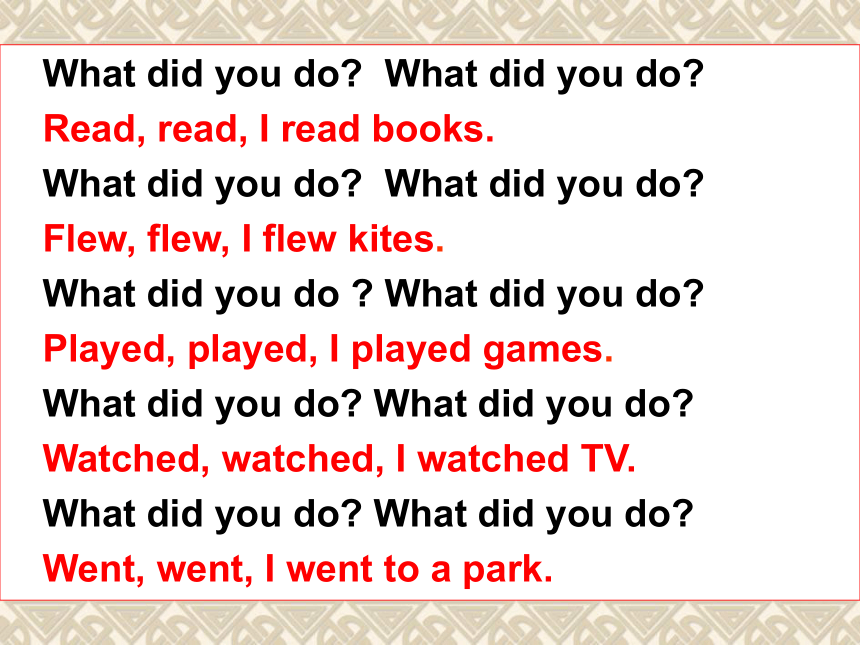
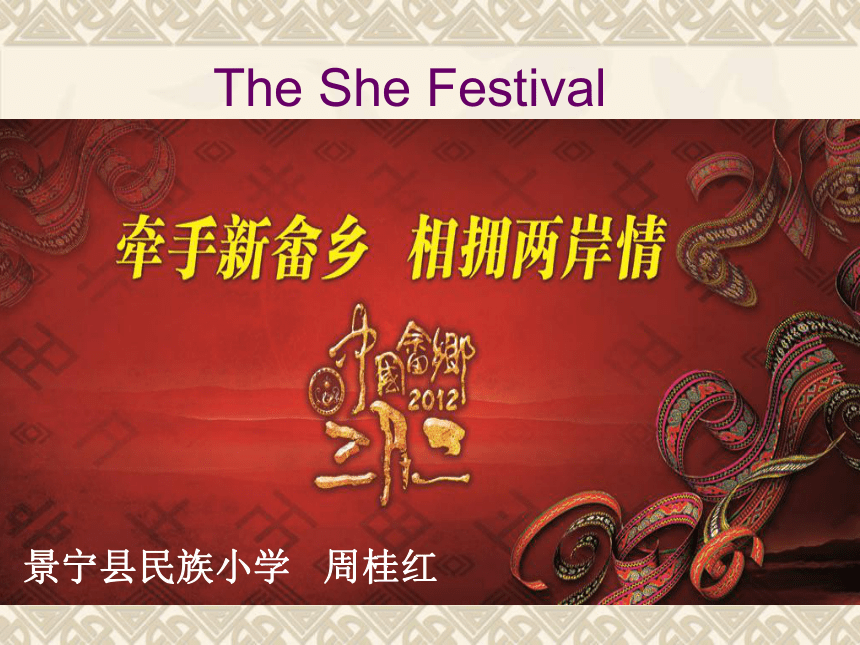
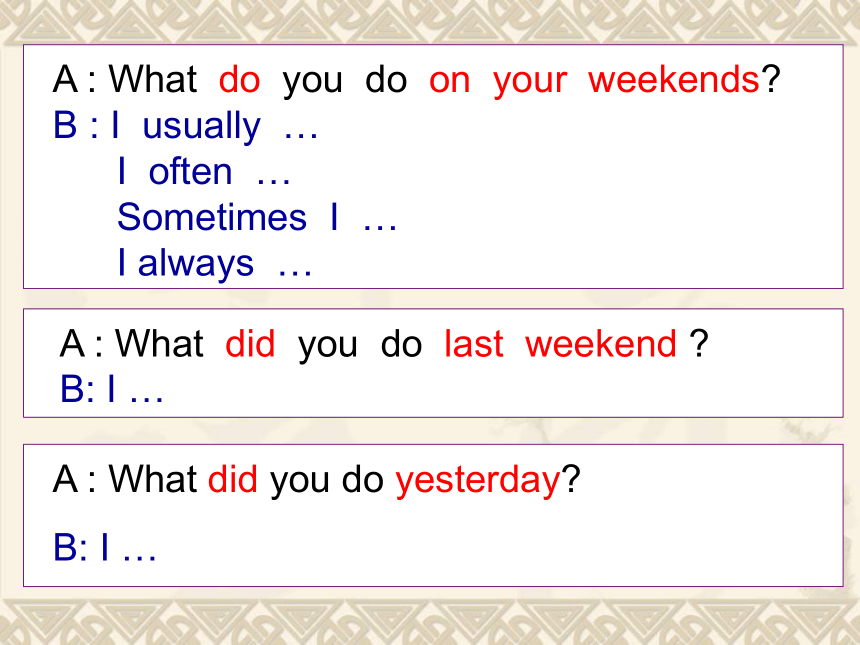
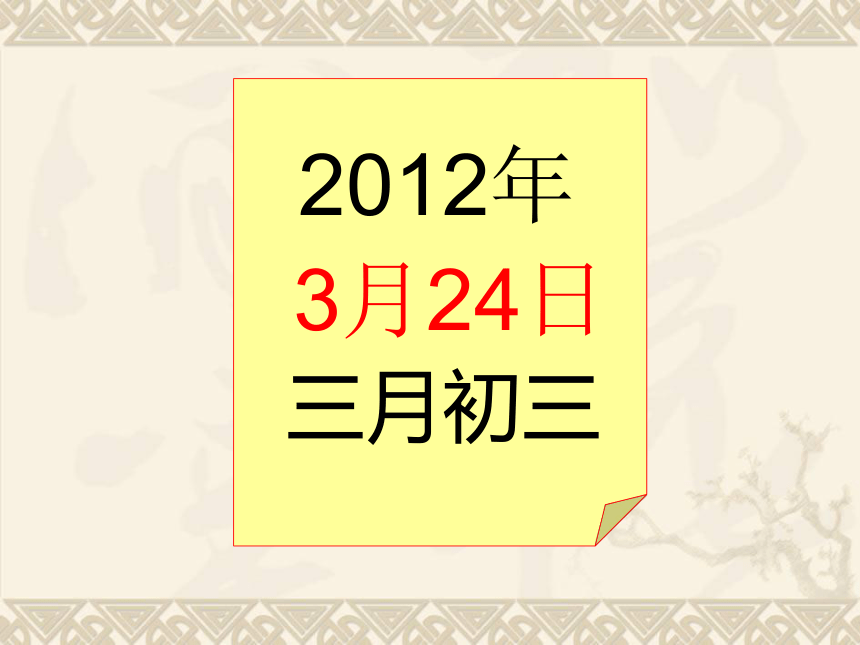
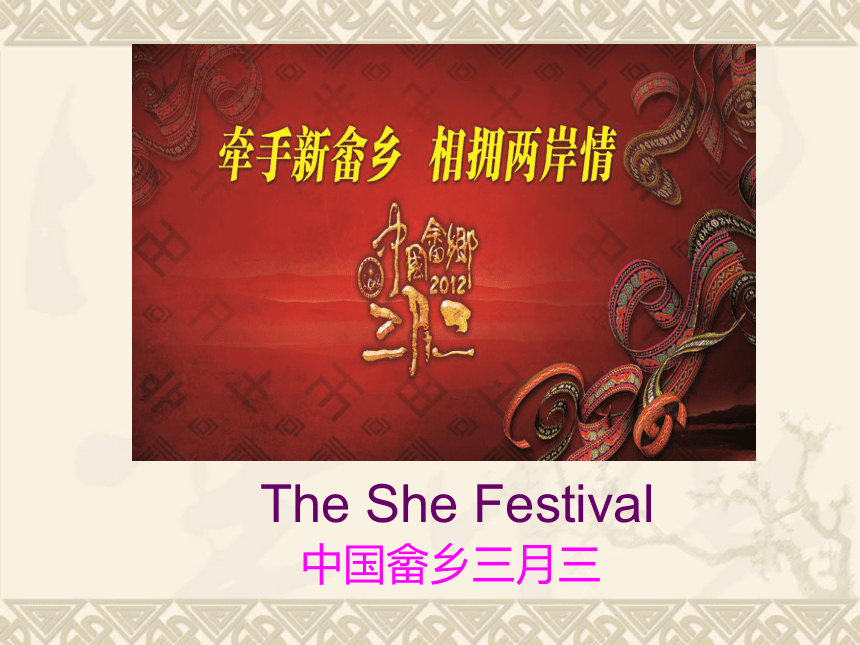
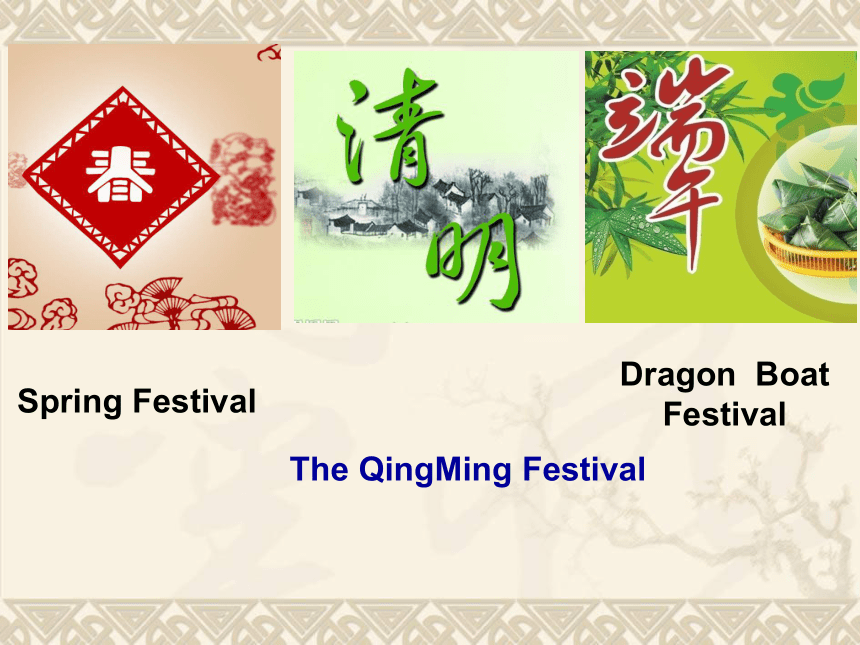
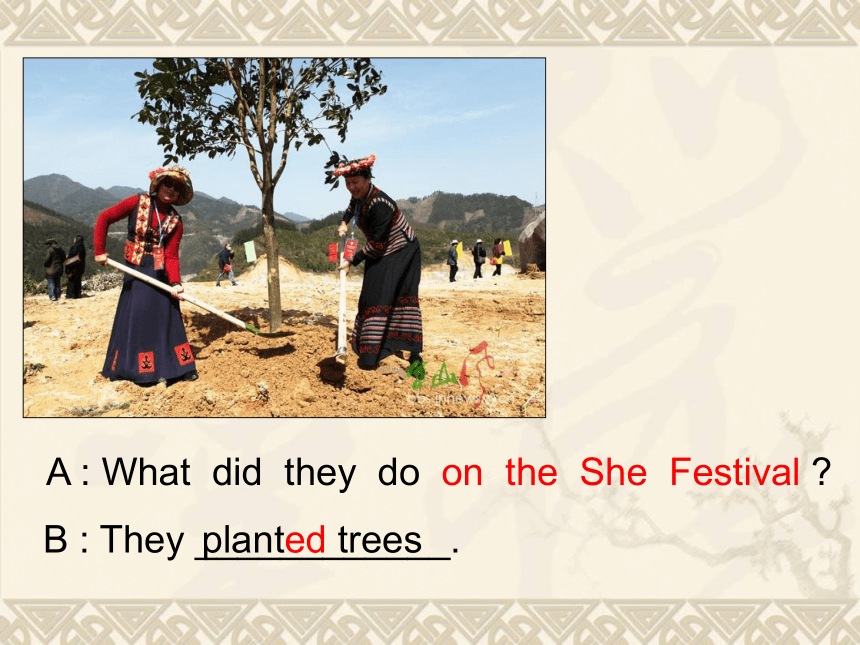
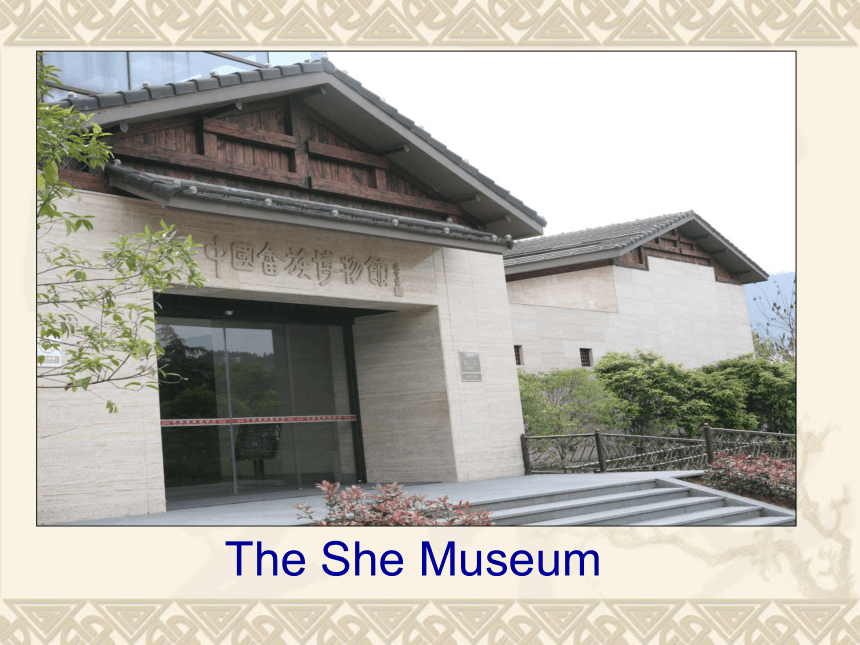
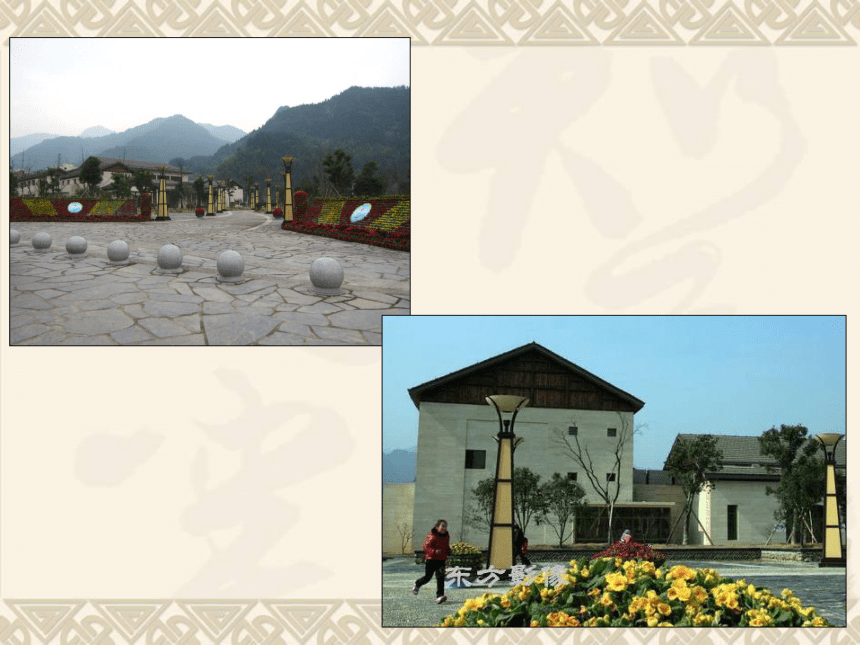
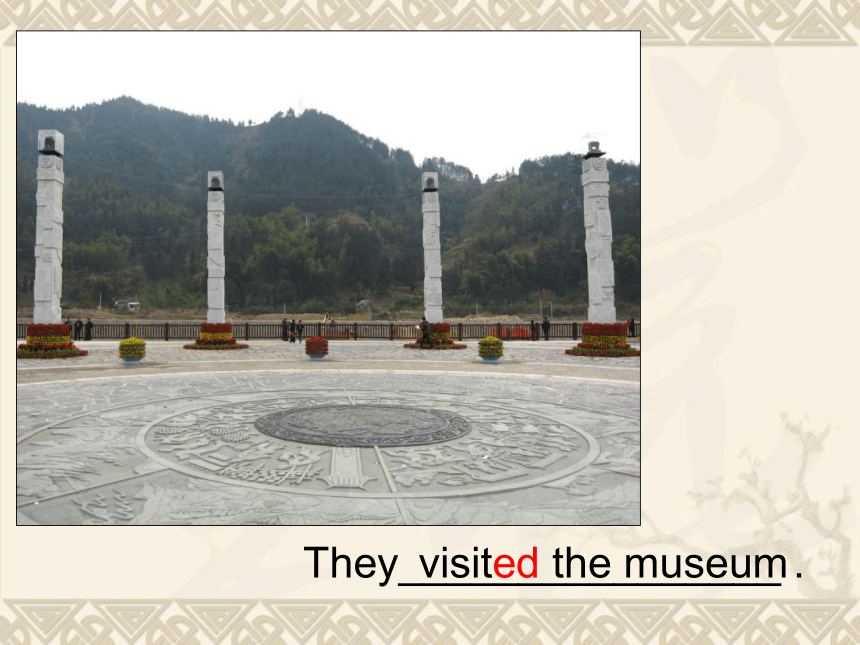
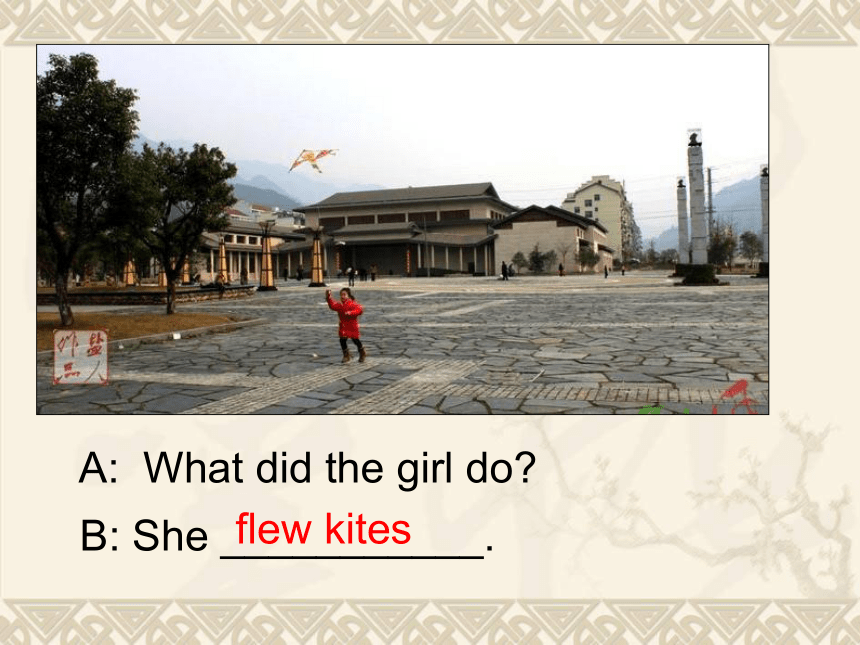
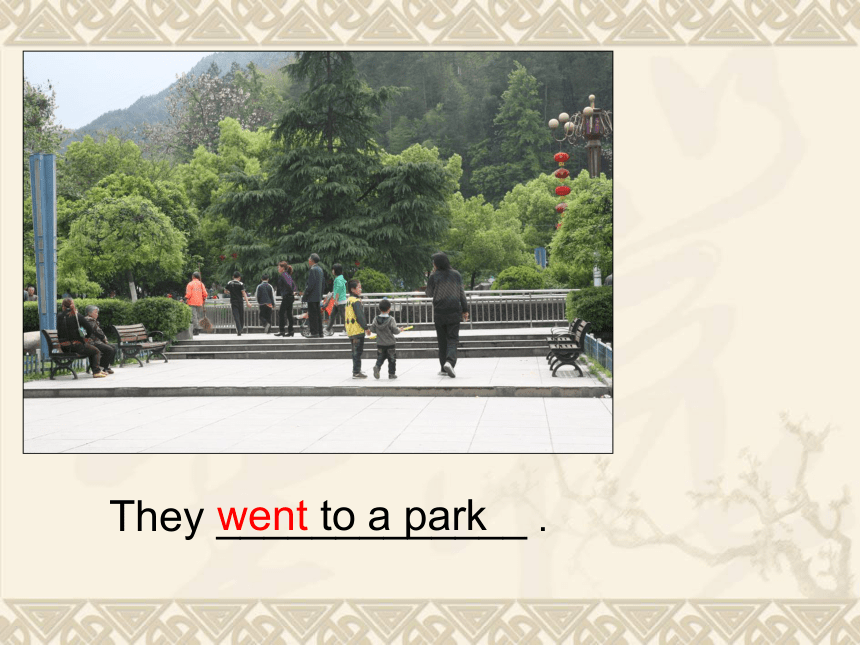
文档简介
(共33张PPT)
What did you do What did you do
Read, read, I read books.
What did you do What did you do
Flew, flew, I flew kites.
What did you do What did you do
Played, played, I played games.
What did you do What did you do
Watched, watched, I watched TV.
What did you do What did you do
Went, went, I went to a park.
景宁县民族小学 周桂红
The She Festival
A : What do you do on your weekends
B : I usually …
I often …
Sometimes I …
I always …
A : What did you do last weekend
B: I …
A : What did you do yesterday
B: I …
3月24日
三月初三
2012年
The She Festival
中国畲乡三月三
Spring Festival
The QingMing Festival
Dragon Boat Festival
B : They ____________.
planted trees
A : What did they do on the She Festival
The She Museum
visited the museum
They________________ .
B: She ___________.
A: What did the girl do
flew kites
went to a park
They _____________ .
A: What did they do
B: They __________ .
did sports
went shopping
B : They ______________ .
A : What did they do
ate good food
They ____________ .
A wonderful performance
演出
They _______________ .
sang and danced
I say You say.
play---
played
learn---
learned
dance---
danced
live---
hope---
lived
hoped
cook--cooked
wash---
washed
visit---
visited
plant---
planted
play---
played
learn---
learned
dance---
danced
live---
hope---
lived
hoped
Tips:
ed
1.在清辅音后面读/t/.
3.在/t/,/d/音后面读/id/.
2.在浊辅音和元音后面读/d/.
wash---
washed
visit---
visited
plant---
planted
/t/
/d/
/d/
/d/
/t/
/t/
/id/
/id/
Can you read them?
play--played
learn--learned
dance--danced
live-- lived
hope--hoped
wash--washed
visit--visited
study--studied
carry-- carried
eat--ate
take---took
have---had
go---went
see---saw
buy--bought
Help the words find their homes.
play--played
dance--danced
eat--ate
study--studied
play-played
dance-danced
study-studied
eat-ate
我发现:
一般的动词直接加:
以不发音的e结尾加:
重读闭音节以辅音加y结尾:改__为__加___
不规则变化动词
ed
d
y i ed
learn--learned
wash--washed
visit--visited
live-- lived
hope--hoped
carry-- carried
see---saw
buy--bought
have---had
go---went
take---took
Tom
How did Tom feel
Task1: Listen and choose the right answer.
A. Sad B. Tired C. Happy
It was sunny today. And I was very happy because it was the She(畲) Festival in Jingning.
In the morning, I went to a park. There were many people in the park. They planted trees there. Then I went shopping and bought some presents for my friends.
Mar.24th
Saturday
Sunny
Tom’s diary
At noon, I was hungry and I ate good food in the restaurant(餐馆). In the afternoon, I took a bus to the museum. In the evening, I watched a wonderful performance(演出). Many stars(明星) came(来) here. They sang and danced. I was so excited and I took many pictures.
I had a happy day. How about you
Task2: Read and answer the questions.
1. What was the weather like on the She Festival
2. Where did Tom go in the morning
_______________________
_______________________
3. What did Tom do at noon
_______________________
4. Did he buy presents for his friends
_______________________
5. How did he go to the museum
_______________________
It was sunny.
He went to a park.
He ate good food.
Yes, he did.
He took a bus to the museum.
Task3: Read the diary again and finish the sentences.
It was a ______day. Tom was very ______on the She Festival.
In the morning, he ______ to a park, then he _______ some presents for his friends. At noon, he _____ good food in the restaurant. In the afternoon,
he_____ a bus to the museum. In the evening, he _______ a wonderful performance. Many stars _____ and ______. He was so excited and he _____ many pictures.
sunny
happy
went
bought
ate
watched
sang
danced
took
took
Task4:Talk about your last She Festival with your partners.
What did you do on the She Festival
I went shopping...
1. read books
2. go shopping
3. fly kites
4. eat good food
5. watch TV
6.go to a park
7. watch a
wonderful
performance…
Task5: 根据所给提示词以“I had a happy/busy day”为题写一篇小短文,短文首句已给出。(别忘了写题目哦,并注意动词的变化形式。)
It was sunny today.
Homework
1. Talk about the She Festival
with your parents.
2. Write a diary about your last
weekend.
巧记动词过去时态
动词一般过去时,表示过去发生事;
be用was或用were, have, has变had;
谓语动词过去式,过去时间坐标志;
一般动词加-ed,若是特殊得硬记。
否定句很简单,主语之后didn’t添;
疑问句也不难,did放在主语前;
如果谓语之前有did,谓语动词需还原;
动词若是was, were,否定就把not添。
Thank you for your listening!
What did you do What did you do
Read, read, I read books.
What did you do What did you do
Flew, flew, I flew kites.
What did you do What did you do
Played, played, I played games.
What did you do What did you do
Watched, watched, I watched TV.
What did you do What did you do
Went, went, I went to a park.
景宁县民族小学 周桂红
The She Festival
A : What do you do on your weekends
B : I usually …
I often …
Sometimes I …
I always …
A : What did you do last weekend
B: I …
A : What did you do yesterday
B: I …
3月24日
三月初三
2012年
The She Festival
中国畲乡三月三
Spring Festival
The QingMing Festival
Dragon Boat Festival
B : They ____________.
planted trees
A : What did they do on the She Festival
The She Museum
visited the museum
They________________ .
B: She ___________.
A: What did the girl do
flew kites
went to a park
They _____________ .
A: What did they do
B: They __________ .
did sports
went shopping
B : They ______________ .
A : What did they do
ate good food
They ____________ .
A wonderful performance
演出
They _______________ .
sang and danced
I say You say.
play---
played
learn---
learned
dance---
danced
live---
hope---
lived
hoped
cook--cooked
wash---
washed
visit---
visited
plant---
planted
play---
played
learn---
learned
dance---
danced
live---
hope---
lived
hoped
Tips:
ed
1.在清辅音后面读/t/.
3.在/t/,/d/音后面读/id/.
2.在浊辅音和元音后面读/d/.
wash---
washed
visit---
visited
plant---
planted
/t/
/d/
/d/
/d/
/t/
/t/
/id/
/id/
Can you read them?
play--played
learn--learned
dance--danced
live-- lived
hope--hoped
wash--washed
visit--visited
study--studied
carry-- carried
eat--ate
take---took
have---had
go---went
see---saw
buy--bought
Help the words find their homes.
play--played
dance--danced
eat--ate
study--studied
play-played
dance-danced
study-studied
eat-ate
我发现:
一般的动词直接加:
以不发音的e结尾加:
重读闭音节以辅音加y结尾:改__为__加___
不规则变化动词
ed
d
y i ed
learn--learned
wash--washed
visit--visited
live-- lived
hope--hoped
carry-- carried
see---saw
buy--bought
have---had
go---went
take---took
Tom
How did Tom feel
Task1: Listen and choose the right answer.
A. Sad B. Tired C. Happy
It was sunny today. And I was very happy because it was the She(畲) Festival in Jingning.
In the morning, I went to a park. There were many people in the park. They planted trees there. Then I went shopping and bought some presents for my friends.
Mar.24th
Saturday
Sunny
Tom’s diary
At noon, I was hungry and I ate good food in the restaurant(餐馆). In the afternoon, I took a bus to the museum. In the evening, I watched a wonderful performance(演出). Many stars(明星) came(来) here. They sang and danced. I was so excited and I took many pictures.
I had a happy day. How about you
Task2: Read and answer the questions.
1. What was the weather like on the She Festival
2. Where did Tom go in the morning
_______________________
_______________________
3. What did Tom do at noon
_______________________
4. Did he buy presents for his friends
_______________________
5. How did he go to the museum
_______________________
It was sunny.
He went to a park.
He ate good food.
Yes, he did.
He took a bus to the museum.
Task3: Read the diary again and finish the sentences.
It was a ______day. Tom was very ______on the She Festival.
In the morning, he ______ to a park, then he _______ some presents for his friends. At noon, he _____ good food in the restaurant. In the afternoon,
he_____ a bus to the museum. In the evening, he _______ a wonderful performance. Many stars _____ and ______. He was so excited and he _____ many pictures.
sunny
happy
went
bought
ate
watched
sang
danced
took
took
Task4:Talk about your last She Festival with your partners.
What did you do on the She Festival
I went shopping...
1. read books
2. go shopping
3. fly kites
4. eat good food
5. watch TV
6.go to a park
7. watch a
wonderful
performance…
Task5: 根据所给提示词以“I had a happy/busy day”为题写一篇小短文,短文首句已给出。(别忘了写题目哦,并注意动词的变化形式。)
It was sunny today.
Homework
1. Talk about the She Festival
with your parents.
2. Write a diary about your last
weekend.
巧记动词过去时态
动词一般过去时,表示过去发生事;
be用was或用were, have, has变had;
谓语动词过去式,过去时间坐标志;
一般动词加-ed,若是特殊得硬记。
否定句很简单,主语之后didn’t添;
疑问句也不难,did放在主语前;
如果谓语之前有did,谓语动词需还原;
动词若是was, were,否定就把not添。
Thank you for your listening!
